Readers in the US will know that its citizens have just observed the federal holiday widely known as Presidents’ Day (depending on the state, you may know it as Presidents Day, President’s Day, Washington’s Birthday, or Washington’s and Lincoln’s Birthday). Whatever the name, the holiday falls on the third Monday in February, and celebrates…well, again, it sort of depends where you are, and how you feel about various early presidents. Hooray for the perfectly rational and well-oiled machine of US policy that is not at all mystifying to the rest of us!
When it comes to celebrating the legacies of fictional presidents, well… a system of checks and balances that works as designed doesn’t seem to make for a plot-friendly setting (although it must be reassuring to those who live under it). But authors are in no way limited by reality. They can tweak their settings in any way that makes for a thrilling adventure tale…and they have! You might enjoy these five venerable SF works in which presidential careers do not go quite according to plan.
Doomsday Morning by C. L. Moore (1957)
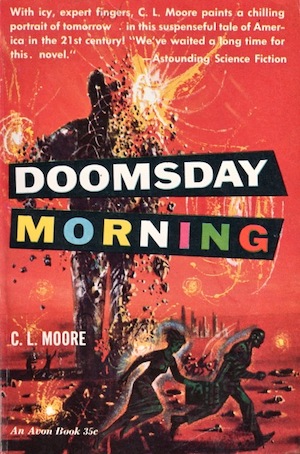
America rewarded President Raleigh for rebuilding the United States after the Five Days War by re-electing him five times. Raleigh’s Communications US (COMUS) shaped American media and helped voters make the right choice. Now, however, however, Raleigh is old and dying. America will soon need its first new president in decades.
Comus boss Tom Nye is determined to be the next president. Not only determined, but sure of winning. Comus will guide the media to support Nye. No other candidate will have a chance.
There is just one tiny problem with Nye’s plan. A problem that must remain SPOILERed. But Nye knows how to fix it: with the help of washed-up actor Howard Rohan. Hijinks ensue.
***
Seven Days in May by Fletcher Knebel & Charles W Bailey II (1962)
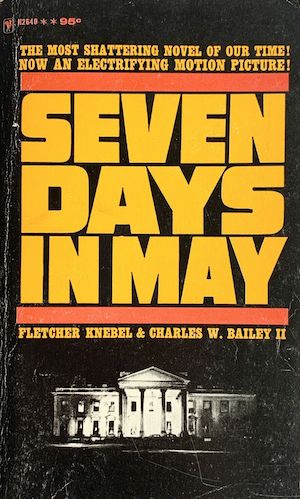
President Frazier (R) saved America and the world when he avoided World War Three; he agreed to a partition of Iran. In so doing, he ensured that he would never be elected to anything again. His replacement, President Lyman (D) has done his best to make America forget all about Frazier’s ignominious end. In just two years, Lyman has forced through ratification of a global nuclear armament treaty1, alienated the military by denying them a much-needed pay raise, and allowed a civilian-defence-worker strike to drag on and on. Many Americans regard the treaty as treasonous; loss of military confidence is weakening him; the strike makes the president look even weaker.
Colonel “Jiggs” Casey believes that Lyman has a far more pressing problem than the robust electoral thrashing Lyman’s 29% approval rating promises. Casey strongly suspects that the Joint Chiefs of Staff and an alliance of business, religious, and political figures are plotting to transform the US into a dictatorship.
Casey cannot prove any of this. All he has is circumstantial evidence, none of it damning. He does not have much time to find the proof: if he’s right, he has seven days to save the republic.
***
The Multiple Man by Ben Bova (1977)
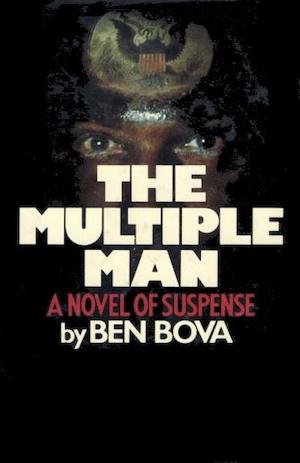
After decades of inept, poorly prepared presidents, President Halliday will be a needed change. He’s a modern-day Renaissance man, with extensive knowledge and superb skills. Surely a Halliday administration will guide America safely through the challenges of the 21st century.
Press Secretary Albano is dumbfounded when he discovers what seems to be Halliday’s dead body. He’s even more dumbfounded to discover that Halliday is still alive; the dead man must be a perfect double of unknown origin. His dumbfounding triples when Albano finds out that the corpse he found is not the first of the corpses popping up here and there. Who are the dead men? Where do they come from? Why isn’t the administration paying any attention to these bizarre occurrences?
It’s not at all clear that Albano will survive learning the answers.
***
The Dead Zone by Stephen King (1979)
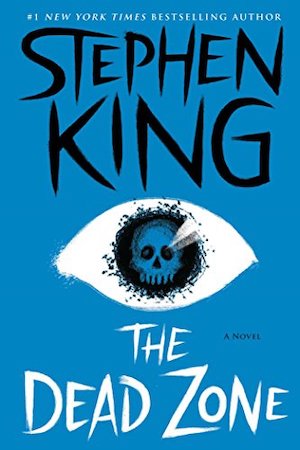
Greg Stillson has many presidential qualities. He is ambitious, he is politically adept, he has a clear vision of the direction in which he plans to lead America, and he has the iron resolve to make his plans reality. With Stillson at the tiller, America’s destiny is assured!
Johnny Smith, who woke from a five-year coma with the gift of precognition, has a unique perspective on Stillson. Smith’s ability to see the future reveals to him two horrifying truths. Firstly, Stillson will be elected president; secondly, once Stillson takes power, he will begin a global thermonuclear war. Which would be bad.
As far as Smith can tell, his precognition is infallible. Being able to see what’s coming does not mean he can prevent it from happening.
***
The Last President by Michael Kurland & S. W. Barton (1980)

It’s hard to believe that a bungled burglary at a famed Washington hotel could bring down a president. In The Last President, one does not need to imagine such a thing because it never officially happened. The burglary is hushed up, the president’s connection to the break-in is never front-page news, and the unnamed president is free to pursue his second term without the complications of a snowballing scandal.
Except…the narrow escape does not seem to have taught the president to use caution. He feels that he is invulnerable, a delusion in which he is supported by a legion of sycophants. They feed the president’s paranoia while enabling his most regrettable impulses.
Some see what is going on and are determined to stop it. But what can even the CIA, the military, and most of the bureaucracy do to rein in a president heedless of convention and even the law itself? A completely unrealistic tale, but a gripping one.
***
No doubt you have read and enjoyed books about fictional presidents whose careers are as troubled as they are entertaining. Feel free to berate me in the comments for overlooking them.
In the words of Wikipedia editor TexasAndroid, prolific book reviewer and perennial Darwin Award nominee James Davis Nicoll is of “questionable notability.” His work has appeared in Publishers Weekly and Romantic Times as well as on his own websites, James Nicoll Reviews and Young People Read Old SFF(where he is assisted by editor Karen Lofstrom and web person Adrienne L. Travis). He is a four-time finalist for the Best Fan Writer Hugo Award and is surprisingly flammable.
[1]In defence of Team Atomic Disarmament Skepticism, it turns out the Soviets have at least one plan in operation to retain nuclear arms while seeming to disarm. The US catches them at it, but there’s no assurance that this is the only cheat the Soviets had planned. In fact, there’s a fair bit of evidence that Lyman is not so much a bold visionary as an optimistic fool. Not that that justifies turning the US over to a junta.
[undefined]undefined










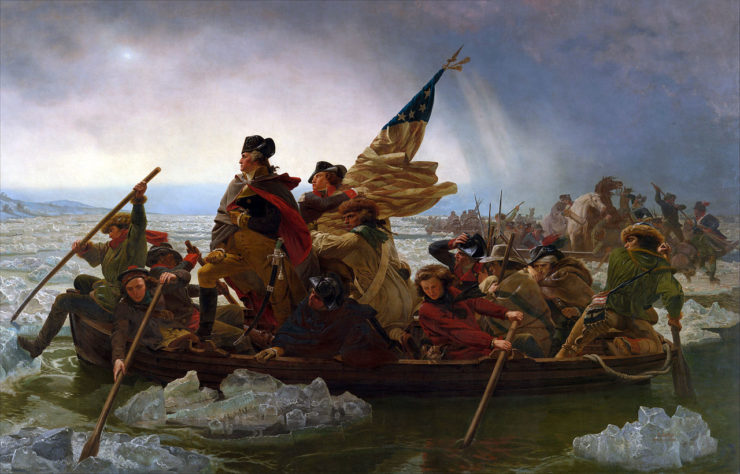
Despite being Henry Fonda, I’ve always doubted that The President’s re-election campaign is going to go all that well after the conclusion of Fail-Safe.
I’d give Fonda’s President better odds than whoever the POTUS was in the backstory to On the Beach.
There was a short story parody of Failsafe in which cities kept getting exchanged because each one has a characteristic that makes the balance of trade not quite right (a Soviet city that was destroyed in balance for a US city had the center of the Soviet movie industry, so of course, Hollywood had to go, etc.). I wish I remembered the title. Now I’m going to have to check old Orbit story listings until I find it.
Allen Drury’s Advise and Consent series kills off at least two presidents, even putting the Speaker of the House into the big chair. The fourth book ends at the Majority Party’s national convention and ends when the Presidential and VP candidates and their wives are shot at by an assassin, killing one man and one woman from different couples. The two sequels are alternate histories of each other, exploring both possible outcomes.
In Jake Sanders and Howard Waldrop’s 1974 The Texas-Israeli War: 1999, the Potus’ problems are two fold: he’s been kidnapped by insurrectionist Texas, and his VP is rather keen on being President, which would be greatly facilitated if the actual POTUS was never rescued.
(Note for Waldrop fans: this is a very atypical Waldrop)
Oh, thought of another funny one. In Richard Hoyt’s Trotsky’s Run, a Soviet asset is on the verge of winning the Presidency. Unfortunately for Russia, and probably the rest of the world, the agent snapped under the pressure of his double-life, and now believes he is Leon Trotsky. He’s pretty bitter about that ice-axe to the head thing, so he has some bold plans for the US nuclear triad as soon as he’s sworn in.
American and Soviet intelligence agencies become aware of the situation, without having any really great ideas about how to manage it.
Well I think we need to mention President Merkin Muffley for most Presidential president who ever presided over a coup and a doomsday. I mean, he did make me stop worrying and love the bomb.
One reasonable candidate for Tom Clancy jumping the shark was that time when he had Jack Ryan accept the position of National Security Advisor (a job that he was plausibly qualified for), and then is asked to be Vice-President when the current one resigned due to a sex scandal. (Yes, the books are dated.) The news cameras capture Ryan being sworn in a few minutes before a 747 lands on top of the President during a joint session of Congress. Ryan becomes POTUS and has no bothersome Congress to stand in his path of doing exactly what the author wants him to do.
@AndyLove
It’s “The Day They Got Boston” and it’s apparently by Herbert Gold. (I remembered the title but had to look up the author.)
Trinity’s Child wrestles with the awkward ambiguity about who the current POTUS is: the actual POTUS, who is incorrectly written off as dead in the initial stages of the limited nuclear exchange, or the minor party hack who managed to survive the first strike, who turns out to have all the skills needed to turn catastrophe into apocalypse.
(It was filmed as By Dawn’s Early Light. The film changes the storyline somewhat, probably because in the book the Soviet first strike is an attempt at mutual disarmament: they will zap all the US nuclear assets and the US will zap theirs, and everyone will be happy. It’s a bonkers plan and it is never in danger of working)
There are a lot of sucky presidents in SFF, but the one that started off okay but then became sucky by the end who sticks in my mind is Morgan Freeman’s version in Deep Impact.
While he probably shouldn’t be misleading people on the sheer scope that he had, and that he essentially starts a coup where he imposes himself as dictator, he does this for essentially good reasons. However, when the missiles finally fail and impact looks certain, he turns tail and runs saving himself. As President his job is essentially to sit in the chair and make the sacrifice along with his people when the space rock arrives. He should have handed off Presidential authority to someone else, someone younger and more junior, rather than save his own skin. Then the closing of the movie shows that, despite the world basically being in ruins with billions dead, he is spending cash and labor by rebuilding government buildings. He was revealed at the end as a coward and a moneywaster.
Also “Night of Camp David” by Fletcher Knebel. Is the President going crazy? One aide suspects something’s wrong.
Long ago, I read a novel called Hard Target by Christopher Hyde, in which the President is going slowly insane due to Creutzfeldt-Jakob Disease, and certain people in the USG have decided that the VP is unacceptable, so a patsy is hired to take them out. I remember it being pretty good.
Interestingly, Amazon.com reports that it was published in January 1604, which is why I think it should qualify as science-fiction, being pretty astoundingly prescient for a book published in the same year as Shakespeare’s Othello and Marlowe’s Doctor Faustus.
Asimov had a short story “The Tercentenary Incident“, which appeared in The Bicentennial Man (the anthology from 1976, not the novel expansion that Silverberg? did later). The President is apparently murdered by a novel disintegration device; fortunately, we’re told, it was a robot double and not actually the President. One man is not so sure.
@8: Thank you! I probably read it in “Political Science Fiction” http://www.isfdb.org/cgi-bin/pl.cgi?614400
A female POTUS is an important character in Seveneves by Neal Stephenson.
Cyril Kornbluth, “The Adventurer”. President Folsom XXIV is Mayor Indbur III squared + Mayor Indbur II = stupid with bouts of viciousness. His son lack much of the stupidity. Some sooper-geniouses have a sooper-seekrit plan to deal with the regime. Hijinks ensue. This doesn’t have the common Kornbluth problem of twice as much plot / twice as many ideas as there should be.
The Year of the Quiet Sun has President Meeks, who lacks most of the positive qualities one would want in a President. Meeks compensates for this by having a time machine. By the time the JCS start planning their coup, he’s already read headlines about how he foiled it. Nevertheless, it doesn’t work out for Meeks (or anyone, really) in the long run because his foreknowledge is a key part of the events leading up nuclear war and social collapse.
I really liked the John Dalmas book, The General’s President. In a crisis, the generals take over, and pick a new president who they think will be malleable. But the man they pick has a mind of his own. I don’t remember the details, but I remember it made me think.
It wasn’t the president, but the Prime Minister of the Solar System or something, but Heinlein’s Double Star, where an actor replaces a politician, was an enjoyable tale. Years later, when I saw the movie Dave (another tale of an actor filling in), it made me think of that old Heinlein book.
Neal Stephenson also (writing as Stephen Bury with his uncle) had a Manchurianesque president-elect assassinated at the inauguration in Interface…
“Doomsday Morning”: nope, that title doesn’t sound worrying at all.
“Seven Days in May”: not a “global nuclear disarmament treaty” then. A global nuclear armament treaty. An interesting approach. An armed planet is a polite planet?
Hooray for the perfectly rational and well-oiled machine of US policy that is not at all mystifying to the rest of us!
Whereas we here in Canada celebrate the birthday of the reigning monarch with Victoria Day, named after a mouldy 19th Century Queen and find it totally logical. And it’s not even on the current monarch’s birthday, either actual or official.
Does Heinlein’s “Double Star” count?
From what little I remember of Dalmas’s The General’s President, the president was undergoing a major depressive episode over how bad things were globally and domestically. The VP was dead, so the Prez appointed the title character as VP. As soon has he was confirmed, the Prez resigned. Since there was a Big Crisis going on, the new president was given supreme authority to Get Things Done, so he didn’t have to listen to those other annoying people in the Senate, House, and Supreme Court.
~
Non-presidential, but Kurgh the Conqueror’s plan succeeded far too well.
@18: the writers of Dave may have been thinking directly of Heinlein’s ?inspiration?, The Prisoner of Zenda.
In Knebel’s Vanished, the only peril is losing an election — and possibly losing the world with it. (No, I can’t explain further without spoiling.) An aide goes missing, and the president obviously knows something but won’t tell anything — even if the CIA director is passing data to his opponent. This was one of his last political thrillers; reportedly he gave up after Watergate, saying he couldn’t do anything that would be neither unbelievable nor derivative-seeming — although Wikipedia tells me his last book involved the Canadian prime minister instead of U.S. characters.
‘The First Patient’ by Michael Palmer, a President who has achieved good progress and is poised to achieve more if re-elected is having worrying apparently mental episodes.
Discovering the the cause is only one part of the puzzle, discovering who and why is another part, but the author reserves another surprise reveal.
In John Carpenter’s Escape from New York, while enroute to a peace conference with the Soviets, the president’s plane is shot down and the president is captured by the inhabitants of New York, which has been converted into a maximum security prison. Worse the president has a cassette tape detailing a practical fusion power system, intended as a peace offering. Extorting former special forces soldier Snake Plisskin into infiltrating and rescuing the president is a clever plan which cannot possibly experience complications…
The Revolution of 1960 by Stanley Weinbaum is very interesting, besides predating most (if not all) of the others.
During college in one my American cultural history classes, I had to watch a movie entitled Gabriel Over the Whitehouse (1933) which was based on the book Rinehard: A Melodrama of the Nineteen-Thirties (1933) by T. F. Tweed. It’s an interesting and an appalling movie all at once. IIRC the President’s body is taking over by the angel Gabriel, who seems to have fascistic tendencies. Does anyone in Torland remember this movie or the book it was based on?
If we go to other, fictional, countries, “Moon Over Parador” (which I may have been the only person who actually liked it, as it bombed) used the “actor replaces President” trope in a comedy.
Slightly off-beam is 1967’s The President’s Analyst, in which it’s not so much the President who’s in trouble as his psychoanalyst, who runs afoul of the CIA and FBI (renamed CEA and FBR for reasons that make no sense), as well as the KGB and Canadian Secret Service and, ultimately, the far more sinister AT&T (aka The Telephone Company). A great and under-appreciated film starring the great and under-appreciated James Coburn (those teeth!).
Which intrigued me enough to go looking for Scandal. It seems to have left no impression on the reading world that I could find.